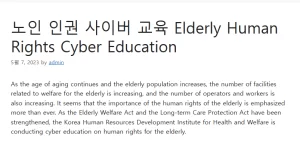As the age of aging continues and the elderly population increases, the number of facilities related to welfare for the elderly is increasing, and the number of operators and workers is also increasing. It seems that the importance of the human rights of the elderly is emphasized more than ever. As the Elderly Welfare Act and the Long-term Care Protection Act have been strengthened, the Korea Human Resources Development Institute for Health and Welfare is conducting cyber education on human rights for the elderly.
Elderly Human Rights Cyber Education is a mandatory education program that operators and workers of senior welfare facilities must complete. As a result, interest in human rights cyber education for the elderly is increasing. Since the education site has been renewed, it looks very different from the existing homepage. Today, we will look at who is eligible for cyber education on human rights for the elderly and how to apply. 노인 인권 사이버 교육

1. Subjects of Cyber Education on Human Rights for the Elderly 좋은뉴스
– Cyber training on human rights of the elderly is an education that can impr ove the sensitivity of the operators and workers of welfare facilities for the elderly to the human rights of the elderly and broaden the understanding of the elderly based on human rights through basic education on the human rights of the elderly. Since the number of participants for cyber education on human rights for the elderly is slightly different for each course, let’s look at those who are compulsory to attend.
1.1. The first step for the human rights of the elderly (Used facilities)
– Operators and workers of facilities using facilities such as welfare facilities for the elderly such as welfare centers for the elderly, institutions specializing in the protection of the elderly, job support institutions for the elderly, and welfare facilities for the elderly at home such as visiting care and visiting nursing are required to take the first step in the human rights of the elderly. You must take it with
1.2. The first step for the human rights of the elderly (living facilities)
– Residential welfare facilities for the elderly, such as nursing homes and community homes for the elderly, medical welfare facilities for the elderly, such as nursing homes, and shelters for the abused seniors You have to.
1.3. The first step in the human rights of the elderly (visiting care service)
– Operators and workers of visiting nursing services, such as visiting nursing, visiting bathing, and visiting nursing services, must take the visiting nursing service, the first step in the human rights of the elderly.
1.4. The first step for the human rights of the elderly (day and night protection service)
– Day and night protection service operators and workers must take the day and night protection service, the first step in the human rights of the elderly.
1.5. Mandatory reporting of elder abuse
– Persons obligated to report elder abuse, medical personnel, employees at welfare facilities for the elderly, public officials in charge of social welfare, and employees at long-term care institutions must take the education for persons obligated to report elder abuse.
Elderly Abuse Reporter Training allows you to know the types of elder abuse and report elder abuse when it occurs.
2. How to Register for Elderly Human Rights Cyber Education
Go to KOHI Human Rights Education
– If you do not have a mobile phone in your name when you register as a member of the website, you must authenticate your i-PIN.
If you have difficulty with this method, please visit the nearest community center and ask if it is possible to issue a private IP address, and then get help.
> Through the above shortcut, access the Senior Human Rights Cyber Education website. When you log in, the login screen appears first. Please log in through membership registration.
> The page you see is the main screen of the Senior Human Rights Cyber Education website. To register for a course that requires learning, click the course registration menu or the shortcut menu for Senior Human Rights Education right below.
> Elderly human rights education courses are available. You can apply for any of these courses. First of all, all education fees are free, and the education period is 21 days from the date of application.
The training time is 6 hours per subject, and the subject for mandatory reporting of elder abuse is 1 hour. Click the red button to register for courses to the right of the course you need to take. Please note that cancellation is also possible here.
> The course search and application page appears. After entering all the required information for the applicant, click the Register for Courses button at the bottom.
> Course registration has been completed easily.
3. How to take the Elderly Human Rights Cyber Education Course
> If you have completed course registration, you must study. To enroll in the course, you can either click the Go to Study Status button on the course registration completion page above, or click the Learn button on the main screen to go to the course you are taking.
> On the Learn page, click the Learn button for the course you wish to take.
> If you click the Learn button at the desired time here, the video lecture will be played.
4. How to issue a certificate of completion
– When all courses are completed, the Certificate of Completion button is activated. At that time, you can print out the certificate of completion. Since the certificate of completion is output as the affiliation information at the time of application for training, you must check the affiliation information before applying for training, and if there are any changes, you must correct the relevant information before proceeding with learning.